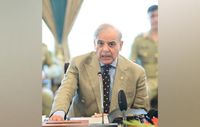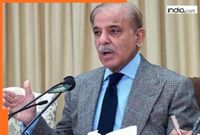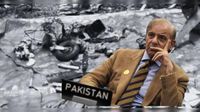Pakistan Prime Minister Shehbaz Sharif addressed the nation on Saturday, May 10, 2025, following a ceasefire agreement with India that was brokered by the United States. The agreement sought to halt military actions across land, air, and sea, aiming to ease escalating tensions between the two countries. However, just hours after the agreement was reached, reports emerged of Pakistani armed forces violating the ceasefire by resuming provocative firings and drone attacks across the Line of Control (LoC) and the International Border (IB).
In his late-night address, Sharif expressed gratitude towards the Pakistan Army for their valour and credited them for what he termed a "historic victory" for Pakistan. He stated that Pakistan had responded positively to the ceasefire in the interest of regional peace and for the welfare of its citizens. Yet, this assertion seemed to starkly contrast with the reality on the ground, where violations of the ceasefire agreement were already underway.
Earlier in the day, Foreign Secretary Vikram Misri confirmed that the Director General of Military Operations (DGMO) of Pakistan had reached out to his Indian counterpart, leading to the agreement to cease all military actions effective from 5 p.m. Indian Standard Time. Misri noted that both sides had given clear instructions to enforce the ceasefire, with another round of DGMO-level talks planned for May 12.
Despite the ceasefire agreement, Pakistani drones were reported in areas from Srinagar in Jammu and Kashmir to Bhuj in Gujarat later that night, prompting concerns and blackouts in border regions. The swift return to hostilities raised questions about Pakistan's commitment to the ceasefire, especially as Sharif celebrated the agreement while his military engaged in violations.
In his address, Sharif accused India of using the April 22 Pahlagam attack as an "excuse" to launch military actions against Pakistan. He characterized the ceasefire as a response to India's aggression and emphasized that it was a victory for Pakistan's principles and respect. "Our operation was against hatred, aggression, and religious fanaticism. This is a victory of our principles and respect," he declared, framing the ceasefire as a testament to Pakistan's military strength.
While Sharif praised his military's response to what he described as Indian aggression, Indian officials have dismissed his claims as fabrications. Misri reiterated that the ceasefire was mutually agreed upon and that India had acted in response to unprovoked aggression from Pakistan. He stated, "For the last few hours, there have been repeated violations of the understanding arrived at earlier this evening between the DGMOs of India and Pakistan. This is a breach of the understanding, and we take very, very serious note of these violations."
As tensions escalated, reports surfaced of artillery shelling in Jammu and Kashmir's Baramulla district and drone activity along the LoC. Indian air defense systems were activated after multiple drone sightings, resulting in the downing of several drones near an Army headquarters. The situation prompted India to place its forces on high alert.
In his speech, Sharif thanked international allies, including US President Donald Trump, Chinese President Xi Jinping, and leaders from Saudi Arabia, Turkey, and the UK, for their roles in brokering the ceasefire. He referred to China as Pakistan's "most reliable and trustworthy friend" and urged the global community to assist in resolving longstanding disputes, including the Indus Waters Treaty and the Kashmir issue.
Despite the celebratory tone of Sharif's address, the reality of the situation remained fraught with tension. The Pakistani Prime Minister's rhetoric painted a picture of a victorious nation, yet the rapid violations of the ceasefire agreement revealed a different narrative. Indian officials have consistently maintained that their actions are precision-based counter-terror operations aimed at protecting their territorial integrity.
As the situation continues to evolve, both nations face significant challenges in maintaining peace and stability in the region. The ceasefire agreement, while a hopeful step, has been undermined by immediate violations, highlighting the fragile nature of the diplomatic efforts made thus far. The upcoming DGMO talks on May 12 will be critical in determining the future of military relations between India and Pakistan.
In a striking moment during his address, Sharif also acknowledged the role of Pakistani social media users, praising them for standing firm against disinformation. He expressed gratitude for their support, stating, "The entire nation stood like a wall of steel behind the armed forces. The blood of our soldiers boils at the enemy’s malicious intentions."
As the world watches the developments between India and Pakistan, the importance of dialogue and mutual understanding cannot be overstated. The ceasefire agreement, while a significant milestone, is now at risk of being overshadowed by ongoing hostilities, requiring both sides to navigate a complex landscape of national pride, military strategy, and international diplomacy.






